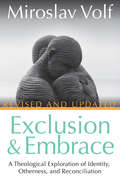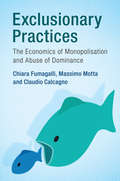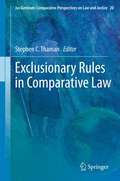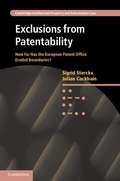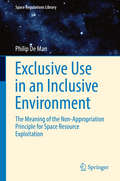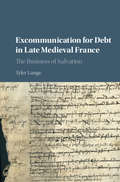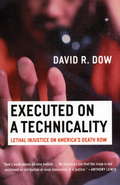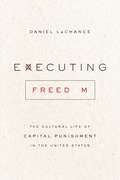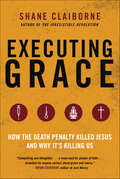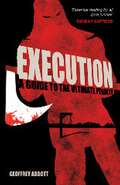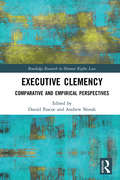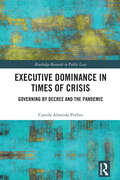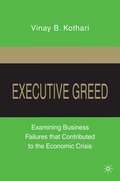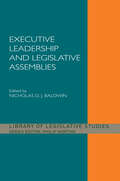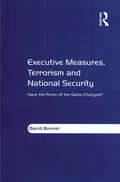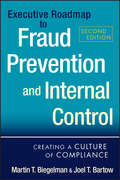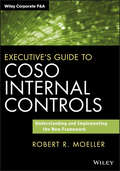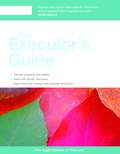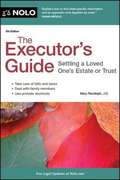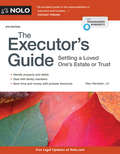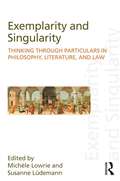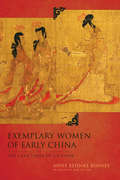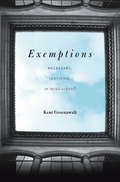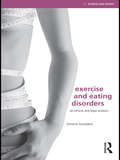- Table View
- List View
Exclusion and Embrace, Revised and Updated: A Theological Exploration of Identity, Otherness, and Reconciliation
by Miroslav VolfLife in the twenty-first century presents a disturbing reality. Otherness, the simple fact of being different in some way, has come to be defined as in and of itself evil. Miroslav Volf contends that if the healing word of the gospel is to be heard today, Christian theology must find ways of speaking that address the hatred of the other. Is there any hope of embracing our enemies? Of opening the door to reconciliation? Reaching back to the New Testament metaphor of salvation as reconciliation, Volf proposes the idea of embrace as a theological response to the problem of exclusion.Increasingly we see that exclusion has become the primary sin, skewing our perceptions of reality and causing us to react out of fear and anger to all those who are not within our (ever-narrowing) circle. In light of this, Christians must learn that salvation comes, not only as we are reconciled to God, and not only as we "learn to live with one another," but as we take the dangerous and costly step of opening ourselves to the other, of enfolding him or her in the same embrace with which we have been enfolded by God.Volf won the 2002 Louisville Grawemeyer Award in Religion for the first edition of his book, Exclusion & Embrace: A Theological Exploration of Identity, Otherness, and Reconciliation (Abingdon, 1996). In that first edition, professor Volf, a Croatian by birth, analyzed the civil war and "ethnic cleansing" in the former Yugoslavia, and he readily found other examples of cultural, ethnic, and racial conflict to illustrate his points. Since September 11, 2001, and the subsequent epidemic of terror and massive refugee suffering throughout the world, Volf revised Exclusion and Embrace to account for the evolving dynamics of inter-ethnic and international strife.
Exclusionary Empire: English Liberty Overseas, 1600-1900
by Jack P. GreeneConsisting of an introduction and ten chapters, Exclusionary Empire examines the transfer of English traditions of liberty and the rule of law overseas from 1600 to 1900. Each chapter is written by a noted specialist and focuses on a particular area of the settler empire - Colonial North America, the West Indies, Ireland, the early United States, Canada, Australia, New Zealand, and South Africa - and on one non-settler colony, India. The book examines the ways in which the polities in each of these areas incorporated these traditions, paying particular attention to the extent to which these traditions were confined to the independent white male segments of society and denied to most others. This collection will be invaluable to all those interested in the history of colonialism, European expansion, the development of empire, the role of cultural inheritance in those histories, and the confinement of access to that inheritance to people of European descent.
Exclusionary Practices: The Economics of Monopolisation and Abuse of Dominance
by Massimo Motta Chiara Fumagalli Claudio CalcagnoThe most controversial area in competition policy is that of exclusionary practices, where actions are taken by dominant firms to deter competitors from challenging their market positions. Economists have been struggling to explain such conduct and to guide policy-makers in designing sensible enforcement rules. In this book, authors Chiara Fumagalli, Massimo Motta, and Claudio Calcagno explore predatory pricing, rebates, exclusive dealing, tying, and vertical foreclosure, through a blend of theory and practice. They develop a general framework which builds on and extends existing economic theories, drawing upon case law, discussions of cases and other practical considerations to identify workable criteria that can guide competition authorities to assess exclusionary practices. Along with analyses of policy implications and insights applied to case studies, the book provides practitioners with non-technical discussions of the issues at hand, while guiding economics students with dedicated technical sections with rigorous formal models.
Exclusionary Rules in Comparative Law
by Stephen C. ThamanThis book is a comparative study of the exclusion of illegally gathered evidence in the criminal trial , which includes 15 country studies, a chapter on the European Court of Human Rights, and a comparative synthetic conclusion. No other book has undertaken such a broad comparative study of exclusionary rules, which have now become a world-wide phenomenon. The topic is one of the most controversial in criminal procedure law, because it reveals a constant tension between the criminal court's duty to ascertain the truth, on the one hand, and its duty to uphold important constitutional rights on the other, most importantly, the privilege against self-incrimination and the right to privacy in one's home and one's private communications. The chapters were contributed by noted world experts on the subject for the XVIII Congress of the International Academy of Comparative Law in Washington in July 2010.
Exclusions from Patentability
by Sigrid Sterckx Julian CockbainExclusions from Patentability reviews the history of the adoption of exclusions from patentability under the European Patent Convention since its first conception in 1949 through to its most recent revision. The analysis shows how other intellectual property treaties, such as UPOV, the Strasbourg Patent Convention, PCT, the EU Biotech Directive and TRIPS have affected the framing of the exclusions. Particular attention is given to those exclusions considered the most contentious (computer programmes, discoveries, medical treatments, life forms and agriculture) and those decisions which have been most influential in shaping the approaches by which the exclusions have been interpreted. The 'morality' exclusion and the interpretation of the exclusions are discussed critically and suggestions for coherent interpretation are made.
Exclusive Use in an Inclusive Environment
by Philip De ManThis book aims to find a workable interpretation of the non-appropriation principle that is compatible with both the existing international space law framework and the move of the private space industry towards the mining of asteroids and other celestial bodies. It does so by analysing the rules on the use of orbits as limited natural resources as a concrete indication of how space resources can be exploited by one user while respecting the non-appropriation principle and the interests of other users in space. This analysis is complemented by a thorough review of the meaning of property rights in the context of the existing international space law regime. This allows the author to distinguish between the lawful exploitation and unlawful appropriation of resources in a manner that could pave the way for a workable asteroid mining regime that takes into account the needs of individual companies and the international community. Exclusive use in an inclusive environment frames the legal regime of the exploitation of natural resources in outer space as the most pressing example to date of the tension that arises between the rights of a single spacefaring actor and the interests of the broader international community. Though academic in its approach in dealing with one of the most fundamental issues of space law to date, the book has very practical ambitions. By offering a pragmatic interpretation of the space law principles that are likely to remain the legal foundations of asteroid mining for the foreseeable future, Exclusive use in an inclusive environment hopes to inform academics, practitioners and policymakers alike in their future attempts at working out a fair, equitable and effective management regime for the exploitation of natural resources in outer space.
Excommunication for Debt in Late Medieval France: The Business of Salvation
by Tyler LangeLate medieval church courts frequently excommunicated debtors at the request of their creditors. Tyler Lange analyzes over 11,000 excommunications between 1380 and 1530 in order to explore the forms, rhythms, and cultural significance of the practice. Three case studies demonstrate how excommunication for debt facilitated minor transactions in an age of scarce small-denomination coinage and how interest-free loans and sales credits could be viewed as encouraging the relations of charitable exchange that were supposed to exist between members of Christ's body. Lange also demonstrates how from 1500 or so believers gradually turned away from the practice and towards secular courts, at the same time as they retained the moralized, economically irrational conception of indebtedness we have yet to shake. The demand-driven rise and fall of excommunication for debt reveals how believers began to reshape the institutional Church well before Martin Luther posted his theses.
Executed on a Technicality
by David DowWhen David Dow took his first capital case, he supported the death penalty. He changed his position as the men on death row became real people to him, and as he came to witness the profound injustices they endured: from coerced confessions to disconcertingly incompetent lawyers; from racist juries and backward judges to a highly arbitrary death penalty system.It is these concrete accounts of the people Dow has known and represented that prove the death penalty is consistently unjust, and it's precisely this fundamental-and lethal-injustice, Dow argues, that should compel us to abandon the system altogether.From the Trade Paperback edition.
Executing Freedom: The Cultural Life of Capital Punishment in the United States
by Daniel LachanceIn the mid-1990s, as public trust in big government was near an all-time low, 80% of Americans told Gallup that they supported the death penalty. Why did people who didn't trust government to regulate the economy or provide daily services nonetheless believe that it should have the power to put its citizens to death? That question is at the heart of Executing Freedom, a powerful, wide-ranging examination of the place of the death penalty in American culture and how it has changed over the years. Drawing on an array of sources, including congressional hearings and campaign speeches, true crime classics like In Cold Blood, and films like Dead Man Walking, Daniel LaChance shows how attitudes toward the death penalty have reflected broader shifts in Americans' thinking about the relationship between the individual and the state. Emerging from the height of 1970s disillusion, the simplicity and moral power of the death penalty became a potent symbol for many Americans of what government could do--and LaChance argues, fascinatingly, that it's the very failure of capital punishment to live up to that mythology that could prove its eventual undoing in the United States.
Executing Grace: How the Death Penalty Killed Jesus and Why It's Killing Us
by Shane ClaiborneIn this reasoned exploration of justice, retribution, and redemption, the champion of the new monastic movement, popular speaker, and author of the bestselling The Irresistible Revolution offers a powerful and persuasive appeal for the abolition of the death penalty.The Bible says an eye for an eye. But is the state’s taking of a life true—or even practical—punishment for convicted prisoners? In this thought-provoking work, Shane Claiborne explores the issue of the death penalty and the contrast between punitive justice and restorative justice, questioning our notions of fairness, revenge, and absolution.Using an historical lens to frame his argument, Claiborne draws on testimonials and examples from Scripture to show how the death penalty is not the ideal of justice that many believe. Not only is a life lost, so too, is the possibility of mercy and grace. In Executing Grace, he reminds us of the divine power of forgiveness, and evokes the fundamental truth of the Gospel—that no one, even a criminal, is beyond redemption.
Execution: A guide to the Ultimate Penalty
by Geoffrey AbbottExecution is a fascinating account of methods of execution through the ages, such as death by cannibalism, being sewn into an animal’s belly and a thousand cuts. From the preparation of the victim to the disposal of the body, Execution answers all the questions you are ever likely to ask, and some you would never want to imagine.
Executive Clemency: Comparative and Empirical Perspectives (Routledge Research in Human Rights Law)
by Daniel PascoeNearly every country in the world has a mechanism for executive clemency, which, though residual in most legal systems, serves as a vital due process safeguard and as an outlet for leniency in punishment. While the origins of clemency lie in the historical prerogative powers of once-absolute rulers, modern clemency laws and practices have evolved to be enormously varied. This volume brings comparative and empirical analysis to bear on executive clemency, building a sociological and political context around systematically-collected data on clemency laws, grants, and decision-making. Some jurisdictions have elaborate constitutional and legal structures for pardoning or commuting a sentence while virtually never doing so, while others have little formal process and yet grant clemency frequently. Using examples from Asia, Europe, Latin America, the Caribbean, and the USA, this comparative analysis of the law and the practice of clemency sheds light on a frequently misunderstood executive power. This book builds on existing academic scholarship and expands the limited geographical scope of prior research, which has tended to focus on North America, the UK, and Australia. It relays the latest state of knowledge on the topic and employs case studies, doctrinal legal analysis, historical research, and statements by clemency decision-making authorities, in explaining why clemency varies so considerably across global legal and political systems. In addition, it includes contributions encompassing international law, transitional justice, and innocence and wrongful convictions, as well as on jurisdictions that are historically under-researched. The book will be of value to practitioners, academics, and students interested in the fields of human rights, criminal law, comparative criminal justice, and international relations.
Executive Dominance in Times of Crisis: Governing by Decree and the Pandemic (Routledge Research in Public Law)
by Camila Almeida PorfiroIn recent times, there has been a growing dominance of executives centered on the figure of a central leader, while parliaments, which should be the focus of political power, are being marginalized. This development reflects a historical process that has only worsened with the COVID-19 emergency. This book argues that the frequent use of unilateral acts by the executive, exacerbated in times of emergency, can lead to a process of serious democratic erosion. It holds that the unlimited expansion of unilateral action is incompatible with the principle of separation of powers and the basic elements of a constitutional democracy. The judicial and legislative branches, especially in times of crisis, must exercise firm control over executive acts. It puts forward the case that they should limit abuses and risks to democracy based on parameters that are attentive to democratic principles, institutional capacities, and the protection of fundamental rights. In this scenario, the book offers a contemporary analysis of executive dominance in Brazil, Italy, and Germany, particularly in the context of the COVID-19 pandemic. It engages with traditional literature on the subject while providing a novel perspective, particularly in relation to the Global South. The book will be of interest to academics and researchers working in the areas of constitutional law and politics, administrative law, and international and comparative law.
Executive Greed
by Vinay B. KothariBy looking at the three most recent economic crises, the S&L crisis, the dot-com bubble, and the recent subprime mortgage disaster, the author explains why and how corporate managers led their organizations toward disasters in the long-run.
Executive Leadership and Legislative Assemblies (Library Of Legislative Studies)
by Nicholas D. J. BaldwinThe relationship between a head of government (head of the executive branch) and a nation's parliament or legislative assembly (the legislative branch) has long been the focus for comment and analysis - for example, has the prime minister in the United Kingdom come to a position of dominance at the expense of the power of parliament? Does the American president stand head and shoulders above Congress? Is a French president master of the system? Need the Russian president pay attention to the Duma? What of the position in other parliamentary and presidential systems?In this book, Baldwin seeks to provide answers, and does so by drawing upon the knowledge and expertise of an international group of scholars whose essays advance our knowledge of the subject.This book was previously published as a special issue of the Journal of Legislative Studies.
Executive Measures, Terrorism and National Security: Have the Rules of the Game Changed?
by David BonnerDavid Bonner presents an historical and contemporary legal analysis of UK governmental use of executive measures, rather than criminal process, to deal with national security threats. The work examines measures of internment, deportation and restriction on movement deployed in the UK and (along with the imposition of collective punishment) also in three emergencies forming part of its withdrawal from colonial empire: Cyprus, Kenya and Malaya. These situations, along with that of Northern Ireland, are used to probe the strengths and weaknesses of ECHR supervision. It is argued that a new human rights era ushered in by a more confident Court of Human Rights and a more confident national judiciary armed with the HRA 1998, has moved us towards greater judicial scrutiny of the application of these measures - a move away from unfettered and unreviewable executive discretion.
Executive Roadmap to Fraud Prevention and Internal Control
by Martin T. Biegelman Joel T. BartowNow in a Second Edition, this practical book helps corporate executives and managers how to set up a comprehensive and effective fraud prevention program in any organization. Completely revised with new cases and examples, the book also discusses new global issues around the Foreign Corrupt Practices Act (FCPA). Additionally, it covers best practices for establishing a unit to protect the financial integrity of a business, among other subjects. The book has many checklists and real-world examples to aid in implementation and an instructor's URL including a test bank to aid in course adoptions.
Executive's Guide to COSO Internal Controls
by Robert R. MoellerEssential guidance on the revised COSO internal controls frameworkNeed the latest on the new, revised COSO internal controls framework? Executive's Guide to COSO Internal Controls provides a step-by-step plan for installing and implementing effective internal controls with an emphasis on building improved IT as well as other internal controls and integrating better risk management processes. The COSO internal controls framework forms the basis for establishing Sarbanes-Oxley compliance and internal controls specialist Robert Moeller looks at topics including the importance of effective systems on internal controls in today's enterprises, the new COSO framework for effective enterprise internal controls, and what has changed since the 1990s internal controls framework.Written by Robert Moeller, an authority in internal controls and IT governancePractical, no-nonsense coverage of all three dimensions of the new COSO frameworkHelps you change systems and processes when implementing the new COSO internal controls frameworkIncludes information on how ISO internal control and risk management standards as well as COBIT can be used with COSO internal controlsOther titles by Robert Moeller: IT Audit, Control, and Security, Executives Guide to IT GovernanceUnder the Sarbanes-Oxley Act, every corporation has to assert that their internal controls are adequate and public accounting firms certifying those internal controls are attesting to the adequacy of those same internal controls, based on the COSO internal controls framework. Executive's Guide to COSO Internal Controls thoroughly considers improved risk management processes as part of the new COSO framework; the importance of IT systems and processes; and risk management techniques.
Executor's Guide, The
by Mary RandolphThe Executor's Guide shows someone who's wrapping up a loved one's matters how to proceed, step by step. It explains what must be done right away and what can wait, and guides readers through a land of unfamiliar legal procedures and terminology. It covers: * preparing for the job of executor or trustee * the first steps to take * claiming life insurance, Social Security and other benefits * making sense of a will * what to do if there is no will * how to determine whether probate is necessary * caring for children and their property * taxes * an overview of probate court proceedings * dealing with family members * handling simple trusts * looking up your state's laws * working with lawyers, appraisers, accountants and other experts The book contains tables that outline key points of each state's laws, the latest information on the new estate tax laws, and helpful worksheets.
Executor's Guide, The
by Mary Randolph J.D.If you're faced with wrapping up the affairs of a loved one who has died, you may feel overwhelmed by all the work ahead -- especially when you're grieving. But with the right legal and practical information, you can do it. The Executor's Guide will help you make progress one step at a time by assisting you in navigating an unfamiliar land of legal procedures and terminology -- all while saving you time and money. It explains how to: prepare for the job of executor or trustee take your first steps claim life insurance, Social Security and other benefits make sense of a will what to do if there is no will determine whether probate is necessary care for children and their property file taxes deal with family members handle trusts look up your state's laws work with lawyers, appraisers, accountants and other experts This edition has been updated to include expanded information on dealing with online accounts, as well as tables outlining key points of each state's laws, the latest information on estate taxes, and worksheets that help you stay organized and on track.
Executor's Guide, The: Settling a Loved One's Estate or Trust
by Mary RandolphThe Executor's Guide shows someone who's wrapping up a loved one's estate how to proceed, step by step. It explains what must be done right away and what can wait, and guides readers through a land of unfamiliar legal procedures and terminology. It covers: preparing for the job of executor or trustee the first steps to take claiming life insurance, Social Security, and other benefits making sense of a will what to do if there is no will how to determine whether probate is necessary--it may not be! managing assets a child inherits taxes an overview of probate court proceedings what you can do to avoid disputes with family members handling trusts looking up your state's laws, and working with lawyers, appraisers, accountants and other experts. The Executor's Guide contains tables that outline key points of each state's laws, the latest information on estate tax laws, and helpful worksheets.
Exemplarity and Singularity: Thinking through Particulars in Philosophy, Literature, and Law
by Susanne Lüdemann Michele LowrieThis book pursues a strand in the history of thought – ranging from codified statutes to looser social expectations – that uses particulars, more specifically examples, to produce norms. Much intellectual history takes ancient Greece as a point of departure. But the practice of exemplarity is historically rooted firmly in ancient Roman rhetoric, oratory, literature, and law – genres that also secured its transmission. Their pragmatic approach results in a conceptualization of politics, social organization, philosophy, and law that is derived from the concrete. It is commonly supposed that, with the shift from pre-modern to modern ways of thinking – as modern knowledge came to privilege abstraction over exempla, the general over the particular – exemplarity lost its way. This book reveals the limits of this understanding. Tracing the role of exemplarity from Rome through to its influence on the fields of literature, politics, philosophy, psychoanalysis and law, it shows how Roman exemplarity has subsisted, not only as a figure of thought, but also as an alternative way to organize and to transmit knowledge.
Exemplary Women of Early China: The Lienü zhuan of Liu Xiang (Translations from the Asian Classics)
by Anne Behnke KinneyIn early China, was it correct for a woman to disobey her father, contradict her husband, or shape the public policy of a son who ruled over a dynasty or state? According to the Lienü zhuan, or Categorized Biographies of Women, it was not only appropriate but necessary for women to step in with wise counsel when fathers, husbands, or rulers strayed from the path of virtue. Compiled toward the end of the Former Han dynasty (202 BCE-9 CE) by Liu Xiang (79-8 BCE), the Lienü zhuan is the earliest extant book in the Chinese tradition solely devoted to the education of women. Far from providing a unified vision of women's roles, the text promotes a diverse and sometimes contradictory range of practices. At one extreme are exemplars resorting to suicide and self-mutilation as a means to preserve chastity and ritual orthodoxy. At the other are bold and outspoken women whose rhetorical mastery helps correct erring rulers, sons, and husbands. The text provides a fascinating overview of the representation of women's roles in early legends, formal speeches on statecraft, and highly fictionalized historical accounts during this foundational period of Chinese history.Over time, the biographies of women became a regular feature of dynastic and local histories and a vehicle for expressing and transmitting concerns about women's social, political, and domestic roles. The Lienü zhuan is also rich in information about the daily life, rituals, and domestic concerns of early China. Inspired by its accounts, artists across the millennia have depicted its stories on screens, paintings, lacquer ware, murals, and stone relief sculpture, extending its reach to literate and illiterate audiences alike.
Exemptions: Necessary, Justified, or Misguided?
by Kent GreenawaltShould laws apply to everyone, or should some people be exempt because of conflicting religious or moral convictions? Through a close study of several cases, from abortion to taxes, Kent Greenawalt demonstrates how to weigh competing values without losing sight of practical considerations like the difficulty of implementing a specific law.
Exercise and Eating Disorders: An Ethical and Legal Analysis (Ethics and Sport)
by Simona GiordanoEating disorders (EDs) have become a social epidemic in the developed world. This book addresses the close links between EDs and exercise, helping us to understand why people with EDs often exercise to excessive and potentially harmful levels. This is also the first book to examine this issue from an ethical and legal perspective, identifying the rights and responsibilities of people with EDs, their families and the fitness professionals and clinicians that work with them. The book offers an accessible account of EDs and closely examines the concept of addiction. Drawing on a wide range of medical, psychological, physiological, sociological and philosophical sources, the book examines the benefits and risks of exercise for the ED population, explores the links between EDs and other abuses of the body in the sports environment and addresses the issue of athletes with disordered eating behaviour. Importantly, the book also surveys current legislation and professional codes of conduct that guide the work of fitness professionals and clinicians in this area and presents a clear and thorough set of case histories and action points to help professionals better understand, and care for, their clients with EDs. Exercise and Eating Disorders is important reading for students of applied ethics, medical ethics and the ethics of sport, as well as for fitness professionals, psychiatrists, clinical psychologists, sports coaches and sport and exercise scientists looking to improve their understanding of this important issue.
